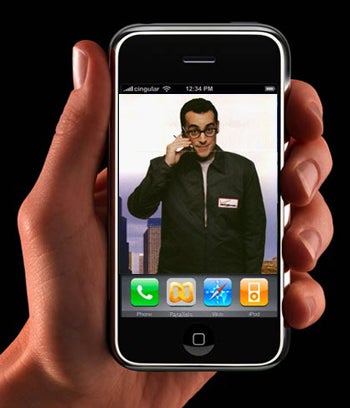Rumors of a Verizon (VZ) iPhone pick up considerable steam, but one wonders what is taking so long. And don’t think it’s just Verizon that will get the iPhone. Also in today’s App Industry Roundup, a new iPhone app can find a doctor.
Verizon to get iPhone
Two things occurred with the iPhone Wednesday that were bound to happen eventually.
 First, a second U.S. carrier will offer the iPhone. According to the Wall Street Journal, Verizon will start selling a CDMA-version of the iPhone early in 2011. Even though executives for Verizon and Apple (AAPL) declined to comment for the story, it’s the strongest indication yet that Verizon will sell the iPhone.
First, a second U.S. carrier will offer the iPhone. According to the Wall Street Journal, Verizon will start selling a CDMA-version of the iPhone early in 2011. Even though executives for Verizon and Apple (AAPL) declined to comment for the story, it’s the strongest indication yet that Verizon will sell the iPhone.
The only thing that’s really newsworthy is that Verizon could be selling the iPhone sooner rather than later. As I said, it was bound to happen. If Verizon is getting the phone in early 2011, ending AT&T’s (T) exclusive agreement, I’d bet that the nation’s other major wireless carriers will be selling Apple’s iconic smartphone phone next year too.
Second, a new style — or form factor — of iPhone is under development. The same story cited the usual “people familiar with the matter” as saying “the fifth-generation iPhone would be a different form factor than those that are currently available” but it “was unclear how soon that version would be available to Verizon or other carriers.”
It’s about time. How many versions of the iPod have been introduced since 2001? Heck, how many have been discontinued? Apple has been remiss regarding iPhone hardware. Since 2007, there has been one style of iPhone (yes, it’s been tweaked).
Now, think about how many variations of Android phones are offered. How many of those come from the same smart-phone maker, such as the Droid phones (Original Droid, Droid X, Droid 2, Extra-crispy Droid) made by Motorola?
The Android makers are having Apple’s lunch in this regard. There are more than 20 Android models — not one or two — that can be selected from all the major wireless carriers. If you’re not aware of how many Android phones are offered, check out the Google Phone Gallery.
If anything, you might ask why Apple is finally getting its act together? One answer is obvious: Android. (And if you were Steve Ballmer and wanted to be optimistic, you would add Windows Phone 7.) Sales for Android have exploded in 2010, thanks to great products from HTC, Samsung and Motorola (MOT).
Android smartphone subscribers in the U.S. reached 10.9 million as of August, from 866,000 a year earlier, according to Comscore Inc. figures cited by the Journal. The iPhone has added users, too, reaching 13.5 million subscribers at the end of August, up from 7.8 million last year. Both those figures are very impressive and speak to what consumers want in a smartphone.
How much bigger would Apple’s figure be if you could buy the iPhone from more than one carrier?
If Apple has made one critical mistake with the iPhone, it’s that it has stuck with AT&T as the exclusive carrier for too long. The iPhone is a certified smash hit, a desirable product that people love to use. But they don’t want to have only choice of carrier for the iPhone. This is not a criticism of AT&T’s network, either, because depending on where you live, you may love AT&T. Or you may hate Verizon, T-Mobile (DTE.SG) and Sprint (S).
The problem is with choice, and so far there is only one from Apple. Specifically, one iPhone and one carrier. That will change soon, inevitably.
Find a Doc
One of life’s little headaches is finding a doctor. Most of us don’t have primary care physicians or a ready-made list of specialists to choose from when the need arises.
Now iPhone owners can download a new app called ZocDoc that will help solve that problem. The app allows users to search for a doc near their home or office, by specialty, appointment availability, and perhaps best of all, by insurance compatibility. Users can book appointments with doctors instantly through the free app. The app even includes users reviews.
The app is tool to enhance the existing ZocDoc.com website, which has an impressive list of backers: Jeff Bezos, Salesforce.com founder Marc Benioff and Khosla Ventures. The site operates in only a handful of cities so far (Washington, D.C., New York, San Francisco, Chicago and now Dallas) so it’s not a tool for everyone just yet.












